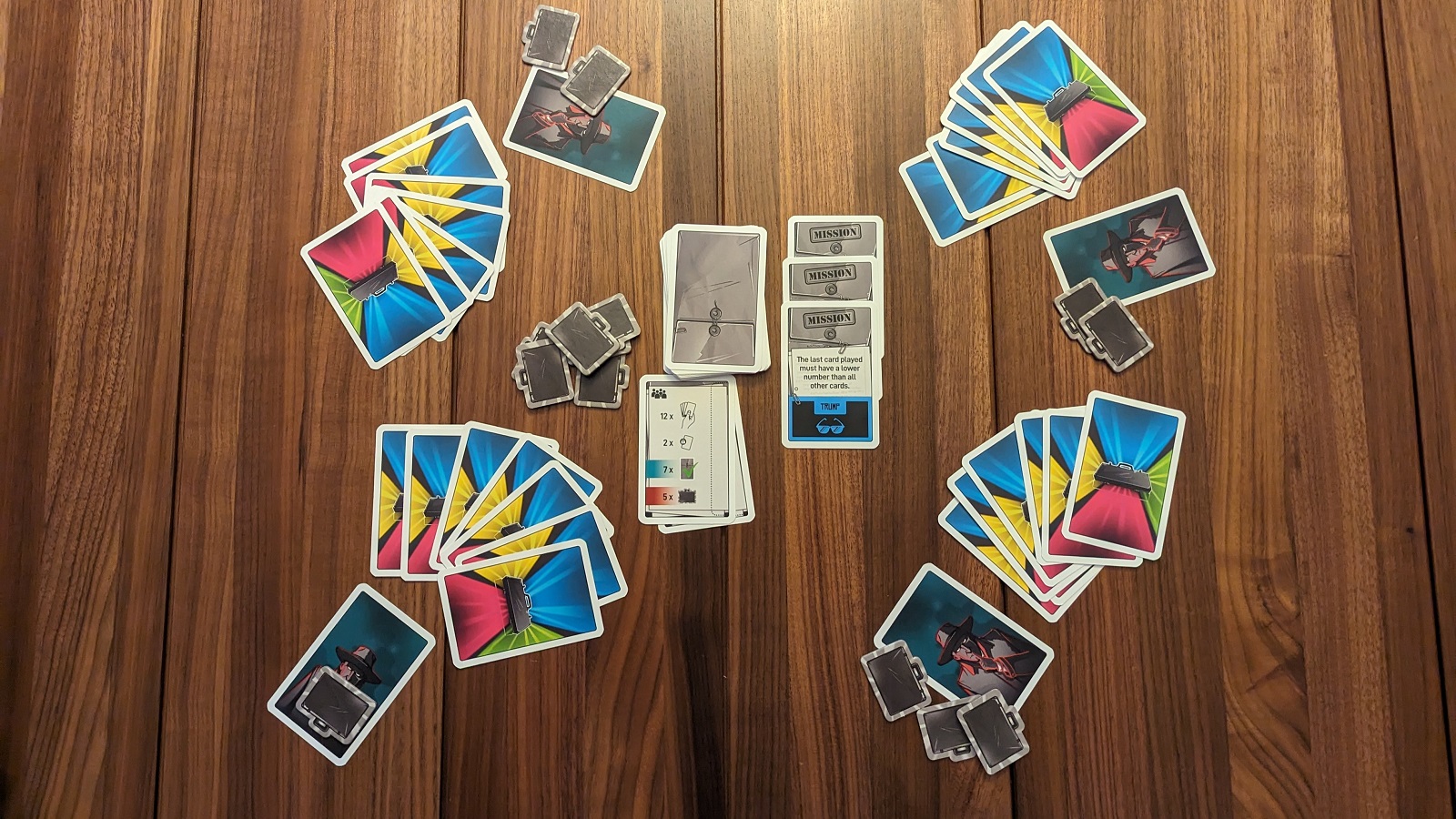Do you like trick taking games like Hearts? Do you like social deduction games like The Resistance? If you said yes to both of those questions, boy do I have a game for you! If you said no to one of those questions… I might have a game for you? If you said no to both those questions… are you ok? Do you need help? Joking aside, my intro is a bit simplistic and binary, but that may just fit Inside Job. This little box is a trick taking game crossed with a hidden traitor game. That’s the game in a nutshell, but if you’re not familiar with either genre let me explain.

A game in progress with four players
Inside Job is a game where players play cards from their hands trying to complete missions. This is done so through trick taking, just like Hearts or Spades. Each round, a mission card will be presented and players will try to complete it. An example of a mission is, “The third card played must have a lower value than all other cards.” The starting player will play one of their cards onto the table and each player going clockwise must play a card. If you have any cards of the same suit you must play a card of that suit. In addition, tied to each mission is a trump suit that could change the options for players. If you don’t have the suit in your hand, you can play any card you want. The player who played the highest card including trump suits wins the trick. This is the trick taking half of the game.
The other half of the game is the Insider. Everyone following the normal rules of trick taking are Agents, and must play cards of the same suit if able. The Insider does not have to follow that rule. They may play any card they want. When someone wins a trick, that player takes an intel token. Note that I said, “wins a trick,” not completes the mission. Agents are trying to complete a certain amount of missions while the Insider is trying to collect a certain amount of intel tokens. These two objectives are only sometimes aligned. As the rounds progress, players inevitably collect intel tokens and the Insider wants to nudge the game so they collect those intel tokens. Complicating things, the Agents are on a time limit as the game will only last a limited number of rounds. If the Agents run out of rounds the game enters a voting phase. Here the Agents try to figure out who the Insider is. If the Insider has the majority votes, the Agents win. If the Insider remains undiscovered, the Insider wins.

Starting hand and team card for a player
The question I found myself trying to answer was, “Is trick taking a fun space for social deduction?” My unhelpful answer is a solid, yes? I enjoyed the game quite a bit, but I could see where it wouldn’t work for some people. Even if you love both genres the trick taking part of the game limits the hidden traitor part of the game. This would appear to be by design. Trick taking is a type of game where a player’s decision space usually narrows as the game plays on. This is in contrast to a lot of games where players have more choices as a game progresses. That is what makes trick taking interesting. Here the narrowing decision space can mean that Agents might not have a choice even if they’re correctly figured out who the Insider is. That may be frustrating for some or illuminating for others. On the other side, working within the play space of trick taking did take some adaptation as the Insider. You could play any card, but it meant you still wanted to be consistent in your card play. Otherwise, an Agent could remember you played out of suit earlier before returning to it later. The structure of trick taking may be helpful for those that don’t like the confrontational nature of social deduction games.
There’s other stuff going on in the box too. When a player has enough intel tokens they will reveal their role card. This is a risk/reward situation where you could hand a win to the Insider, but you could also learn who you can trust.There are special roles that add complications to the Agents, the Insider, and even add a third team into the mix. We never managed to play enough with these roles to really understand each combination of roles, but the beauty of such a short game is that you could. You would really have to spend some time with the special role to develop a meta game, and that is also a part of trick taking games. Trick taking games play so fast that you can play a lot of games over the course of an evening. At its core, I liked the general simplicity of the Agents and the Insider as I was always introducing the game to new people. If the basic game works, I think that’s a positive because if you want to continue diving deeper, you can. There’s also more advanced rules for wagering intel tokens. This creates a new trump suit in the trick and gives players more control over the game. I found these rules to be more immediately impactful and I would always play with them.

Mission card examples
The game has a two player mode. I don’t know why, and I don’t recommend the two player mode at all. On the upside, Inside Job does something well that a lot of social deduction games struggle with. The game plays best at 4 or 5 players. This is a player count I don’t usually recommend with most social deduction games as the genre excels at larger player counts. At the very least I think there’s merit in having a social deduction game that excels at a “lower” player count.
Despite my binary intro, Inside Job is more flexible than I give the game credit for. Maybe trick taking players will love the additional complication of a traitor. I’m not quite as convinced that social deduction lovers will like the more rigid nature of a trick taking game. Either way, Inside Job succeeds at bridging the gap between two very different genres. At the end of the day, I’m happy to have a social deduction game that plays well with 4 or 5 players as it adds to my toolbox for the genre.
Chris began tabletop gaming in college and quickly fell into the addictive world of cardboard. Beginning with D&D and Catan he became an enthusiast of all things gaming; analog or digital. Chris, now a relapsed MtG player, loves connecting with people via gaming through RPGs, board games, and video games. A particular favorite is testing friendships through social deduction games.

Inside Job is a game that successfully bridges the gap between trick taking and hidden traitors. Games are quick like while adding the fun complication of wondering who you can trust. The basic rules are fun, but the wagering rules add even more control for players from trick to trick. There are special roles to continue adding more complications for those wanting more. Inside Job is a fun card game for lovers of trick taking, social deduction, and both.
PROS
- The core game is easy to teach and fun
- Games are lightning quick
- Players well at “lower” player counts (for social deduction)
CONS
- Special roles require some commitment to learn
- Some players may not like how trick taking limits your choices
See below for our list of partners and affiliates:

























